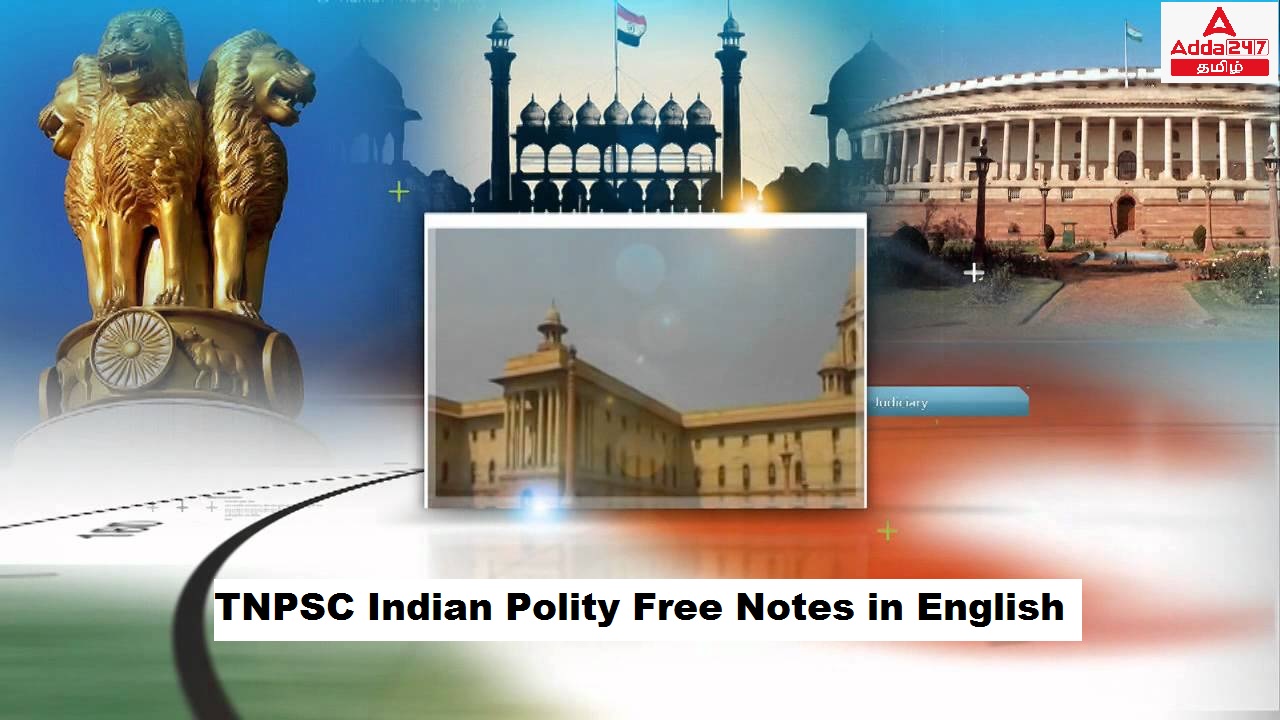இந்தக் கட்டுரையில், TNPSC குரூப் 1, குரூப் 2, குரூப் 2A, குரூப் 4 மாநிலப் போட்டித் தேர்வுகளான TNUSRB, TRB, TET, TNEB போன்றவற்றுக்கான முறைகள் இலவசக் குறிப்புகளைப் பெறுவீர்கள்.தேர்வுக்கு தயாராவோர் இங்குள்ள பாடக்குறிப்புகளை படித்து பயன்பெற வாழ்த்துகிறோம்.
Directive Principles of State Policy
Introduction
The Directive Principles of State Policy are enumerated in Part IV of the Constitution
from Articles 36 to 51.
These principles are not enforceable by the courts, but they are fundamental for the
governance of the country.
The Government is duty bound to apply these principles while making laws.
They aim at promoting the Social Welfare of the people.
Dr. B.R. Ambedkar described these principles as ‘novel features’ of the Indian
Constitution.
Government ethical principles create social welfare with an adequate socio-economic
goal for all citizens
Majority of the directive principles are the guiding principle for the establishment of the
socio-economic norms specified in the Indian political system.
Further these principles include socio-economic, political justice, education
administration, culture, international peace and security.
Classification of the DPSP:
Socialistic Principle – These principles aim at the concept of Socialism
i.e., to provide social and economic justice in the State.
Art 38, Art 39, Art 39A, Art 41, Art 42, Art 43A, Art 46.
Gandhian Principle – These principles aim at the concept of Gandhian ideology i.e.,
upliftment of SC’s, ST’s, Village Panchayat and its development, ban of intoxicating
drinks, etc.
Art 40, Art 43, Art 46, Art 47, Art 48.
Liberal–Intellectual Principle – These principles aim at the concept of Liberalism i.e., it
depends on the intellect of the Citizens.
Art 44, Art 45, Art 48A.
Article 36
In this part, unless the context otherwise requires, “ the State” has the same meaning as
in the part III.
Article 37
Directive principles do not control the government.
But the government should consider this when enacting legislation.
No court can question the implementation of government directive principle.
Article 38
The government should make efforts to improve the well-being of the people and
maintain social order.
The state government should try to minimise the inequalities in income, status,
facilities and opportunities.
Article 39
Resources in the community should be shared equally by all.
To prevent the resources and powers of the community from accumulating in one.
Equal pay for equal work.
Create opportunities for healthy development of children.
Article 39A
The government should take steps to provide equal and free legal aid.
Article 40
The government should make efforts to establish panchayat raj systems.
73 rd Constitution Amendment Act of 1993, enacted Panchayat Raj.
Article 41
Government should provide financial assistance to those who are unable to earn
income due to immorality, illiteracy, unemployment, geriatrics and other reasons.
Example: National Social Assistance Program 1995.
Article 42
Provide conditional on appointment and humanitarian assistance to employees.
Provide maternity assistance.
Maternity Assistance Act-1961 for 6 months (168 days).
Article 43
The government should pave the way for the development of the cottage industry
with private participation.
Article 43A
The government should pave the way for workers to participate in factory
management.
Article 43B
Promotion of Co-operative societies
Article 44
Uniform Civil code for all citizens
Article 45
The government should pave way for providing free compulsory education to
children between the ages of 6 and 14.
Children between the ages of 0 and 6 should be Taken care of
Article 46
Improve the educational and economic status of the downtrodden and tribal
backwards.
Article 47
The government should ban alcohol and drugs and dangerous drugs that can be
harmful to health.
National Drug Research Center – Lucknow.
Improve the health of the people and provide nutrition.
Article 48
Cow-milking animal should be protected from carrying burdens such as calves
Animal Prevention Act-1960.
Introduce new modern methods in the field of agriculture.
Article 48A
Government should take steps to protect and improve the environment.
Make way to protect the forest and wildlife.
The 42nd Amendment Act of 1976 was added.
Example
1972 Wildlife Conservation Act, Gujarat Gir National Park.
1973-Tiger Conservation Plan.
1974-Water Conservation Project.
1976-Community Forest Conservation Program.
1980-Forest Conservation Act (Amended 1988).
1981-Air Safety Act.
1986-Environmental Protection Act.
1992-Elephant Conservation Project.
2006-Forest Rights Act.
Article 49
The government should protect heritage monuments such as monuments of
national importance.
Article 50
The administration and the judiciary should be separated.
Article 51
The government should safeguard world peace and cultural relations and resolve
any issues peacefully.
Directives outside Part IV:
Apart from the Directives included in Part IV, there are some other Directives contained
in other Parts of the Constitution.
Part XVI, Article 335 – Claims of SCs and STs to Services: The claims of the members
of the Scheduled Castes and the Scheduled Tribes shall be taken into consideration,
consistently with the maintenance of efficiency of administration, in the making of
appointments to services and posts in connection with the affairs of the Union or a
State.
Part XVII, Article 350-A- Instruction in mother tongue: It shall be the endeavour of
every state and every local authority within the state to provide adequate facilities
for instruction in the mother-tongue at the primary stage of education to children
belonging to linguistic minority groups.
Part XVII, Article 351 – Development of the Hindi Language: It shall be the duty of the
Union to promote the spread of the Hindi language and to develop it so that it may
serve as a medium of expression for all the elements of the composite culture of
India.
42 nd Amendment Act of 1976
This added four new Directive Principles to the original list.
To secure opportunities for healthy development of children (Article 39).
To promote equal justice and to provide free legal aid to the poor (Article39 A).
To take steps to secure the participation of workers in the management of industries
(Article 43 A)
To protect and improve the environment and to safeguard forests and wildlife
(Article 48 A).
44 th Amendment Act of 1978
The States shall strive to minimise inequalities in income, status, facilities and
opportunities (Article 38).
86 th Amendment Act of 2002
The 86 th Amendment Act of 2002 changed the subject-matter of Article 45 and made
elementary education a fundamental right under Article 21 A.
The amended directive requires the State to provide early childhood care and education
for all children until they complete the age of six years.
97 th Amendment Act of 2011
The 97 th Amendment Act of 2011 added a new Directive Principle relating to co-
operative societies. It requires the state to promote voluntary formation, autonomous
functioning, democratic control and professional management of co-operative societies
(Article 43B).
Fundamental Duties
The original Constitution which came into force with effect from 26 January 1950 did
not contain Fundamental Duties.
The 42 nd Amendment Act of 1976 added some responsibilities of citizens to our
Constitution called the Fundamental Duties.
This amendment added a new part, namely, Part IVA to the Constitution. This new part
consists of only one Article that is Article 51A which for the first time specified a code of
ten fundamental duties of the citizens.
List of Fundamental Duties
(a) Respect for the Constitution and its ideals and institutions, the National Flag and the
National Anthem.
(b) To follow and cherish the noble ideals which inspired our National Struggle for freedom.
(c) To uphold and protect the sovereignty, unity and integrity of India.
(d) To defend the country and render national service when called upon to do so.
(e) To promote harmony and spirit of common brotherhood amongst all the people of
India, transcending religious, linguistic, regional or sectional diversities, to renounce
practices derogatory to the dignity of women.
(f) To value and preserve the rich heritage of our composite culture.
(g) To protect and improve the natural environment including forests, lakes, rivers and
wildlife and have compassion on living creatures.
(h) To develop the scientific temper, humanism and the spirit of inquiry and reform.
(i) To safeguard public property and to abjure from violence.
(j) To strive towards excellence in all spheres of individual and collective activity, so that
the nation constantly rises to higher levels of endeavour and achievements.
(k) To provide opportunities for education by the parent and guardian to their child or ward
between age of six and fourteen years. (Incorporated into the Constitution in 2002
under the 86 th Amendment)
The fundamental duties were included in the constitution as per the
recommendation of the Swaran Singh Committee.
The Justice Verma Committee was set up in 1999 to report on the teaching of
fundamental duties to citizens.
Its report was submitted in 2000. This report recommended teaching in fundamental
duties in an educational way.
In 2003, the Supreme Court asked the Central Government to implement the
recommendations of the Judge Verma Committee.
**************************************************************************
| Adda247 TamilNadu Home page | Click here |
| Official Website=Adda247 | Click here |




